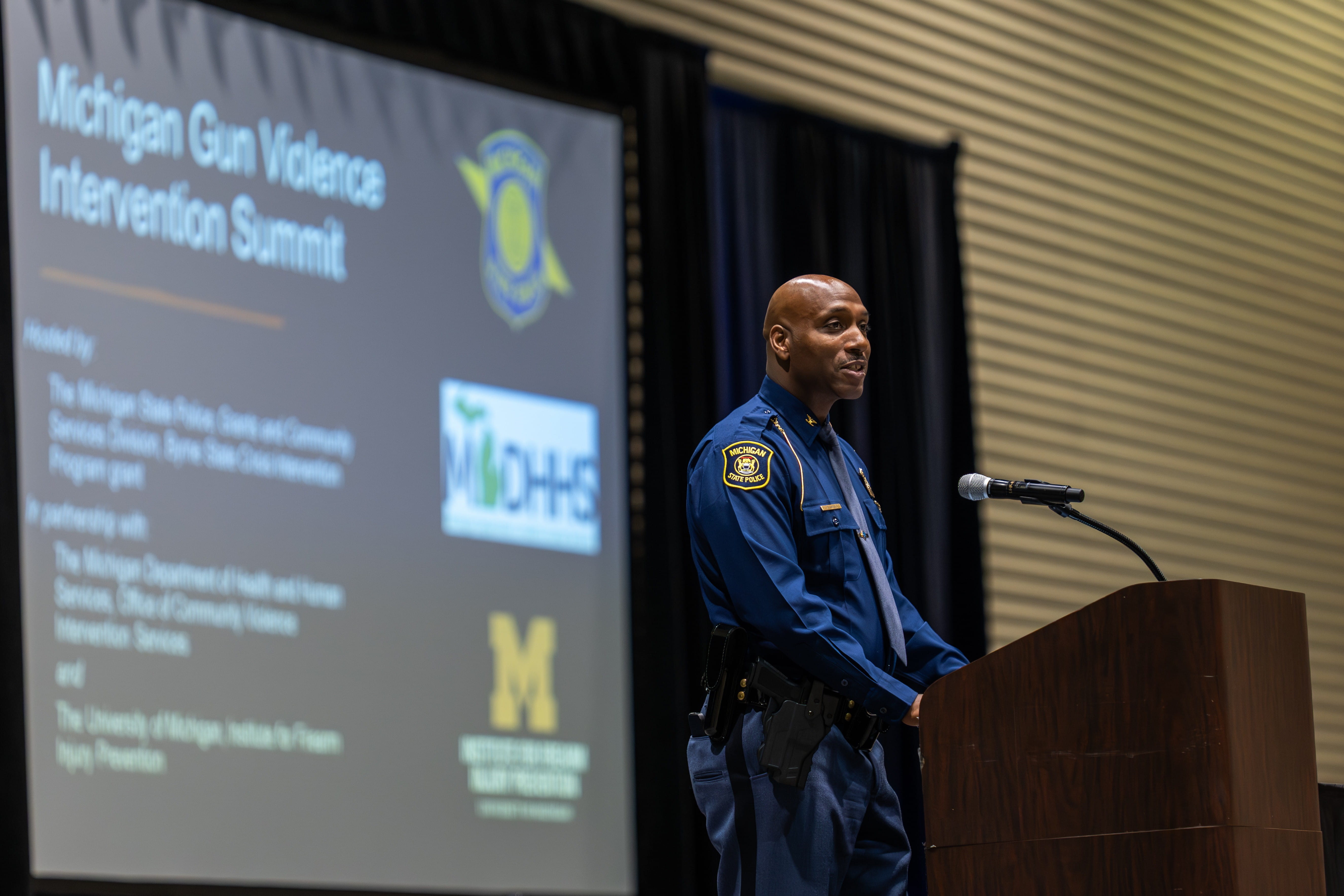The web Browser you are currently using is unsupported, and some features of this site may not work as intended. Please update to a modern browser such as Chrome, Firefox or Edge to experience all features Michigan.gov has to offer.
Michigan State Police Hosts More Than 300 Community Leaders, Law Enforcement and Health Professionals at Gun Violence Intervention Summit
October 09, 2025
The Michigan State Police (MSP) Grants and Community Services Division, in collaboration with the Michigan Department of Health and Human Services (MDHHS) and University of Michigan Institute for Firearm Injury Prevention, hosted a statewide Michigan Gun Violence Intervention Summit on October 7 – 8 at the Lansing Center in Lansing, Mich.
To address gun violence as one of the leading causes of death across the U.S. for people of all ages and communities, more than 300 participants from across Michigan joined the two-day summit – from law enforcement and educators to public health officials and community leaders, parents and youth. The event emphasized the power of partnership across sectors in addressing gun violence and continuing to promote safer, healthier communities.
Gov. Gretchen Whitmer addressed attendees on day one of the summit. “As a former prosecutor, I’m committed to helping local communities across Michigan keep people safe and save lives,” stated Governor Whitmer. “That’s why we’ve made historic investments in public safety, enacted commonsense gun violence prevention laws to keep people safe, instituted stronger penalties to prevent those convicted of violent domestic abuse from owning a firearm and taken more than 850 illegal firearms off the street through Operation Safe Neighborhoods. As a result, Michigan has seen major drops in violent crimes and communities are safer for families. Let’s keep working hard to protect Michiganders, end gun violence and build a safer Michigan.”

In his remarks to attendees, Col. James F. Grady II, director of the MSP said, “Ending gun violence is not something law enforcement can solve on our own. Reducing crime and violence requires an integrated approach – one that we are committed to as we work to build a Michigan where everyone feels safe and secure.” He added, “The value of this summit is it allowed attendees to collaboratively discuss insights, experience, best practices and research to develop strategies that will continue to strengthen public safety across Michigan.”
The summit featured sessions from a range of experts, including Developmental Psychologist Dr. Stephanie Grant, who spoke about how gun violence-related trauma affects children and families.
A panel with staff members from the Ingham County Teen Weapons Court, including The Honorable Rosemarie Aquilina, gave real-life examples of their program’s success in offering intervention and a second chance for teens facing their first weapons-related offense. These programs emphasize the role of youth and parents in community-based prevention and show the ways partnerships can enhance programming statewide.
“Gun violence is a public health crisis that impacts us all," said Elizabeth Hertel, MDHHS Director. "This summit brings together the people and partnerships needed to build safer communities and save lives. I’m grateful for the organizations and individuals doing this work every day and proud that MDHHS is supporting solutions that are community-led, evidence-informed and already making a difference across Michigan.”
A session focused on the use of Extreme Risk Protection Orders, which temporarily remove firearms from individuals who may pose a danger to themselves or others. The conversation leaned on the importance of using data and real-world experience to shape policies that not only reduce risk but also build trust in the communities and prevent violence before it occurs.
“Effective gun violence prevention requires evidence-based solutions grounded in both research and community experience,” said April Zeoli, PhD, MPH, associate professor and director of the University of Michigan Firearm Law Implementation Program. “Our partnership with the MSP and MDHHS ensures intervention programs are not only effective but sustainable, and this summit highlighted how collaboration can translate knowledge into action.”
Since January 2024, the MSP has awarded more than $8 million in Byrne State Crisis Intervention Program (SCIP) grants to support over 20 community-based gun violence intervention programs across Michigan. These programs are already making an impact. The Boys & Girls Clubs of Greater Southwest Michigan presented at the summit, explaining how their SCIP grant helped expand their Night Court basketball and mentor program and education resources for at-risk youth in Berrien County.
“Gun violence is not just a big city problem. It touches communities like ours, too,” said Alloyd Blackmon, CEO of the Boys & Girls Clubs of Greater Southwest Michigan. “The grant from the MSP is helping us address the problem at its roots. By giving kids positive outlets and strong role models, we’re steering them away from situations where violence can occur. We’ve already seen fewer conflicts and more kids choosing to stay engaged in safe, structured activities. That’s the kind of change that keeps neighborhoods safer and gives families hope.”
Dr. Natasha Bagdasarian, Chief Medical Executive, MDHHS, shared upcoming recommendations from the Michigan Gun Violence Task Force and reinforced Michigan’s ongoing commitment to supporting community-based programs. Participants learned how these initiatives will continue to help communities prevent violence and keep residents safe.
For more information about grants administered by the MSP, please visit the Grants and Community Services Division webpage.
*This project was supported by Grant No. 15PBJA-23-GG-00017-BSCI awarded by the Bureau of Justice Assistance. The Bureau of Justice Assistance is a component of the U.S. Department of Justice's Office of Justice Programs, which also includes the Bureau of Justice Statistics, the National Institute of Justice, the Office of Juvenile Justice and Delinquency Prevention, the Office for Victims of Crime, and the SMART Office. Points of view or opinions in this document are those of the author and do not necessarily represent the official position or policies of the U.S. Department of Justice.





